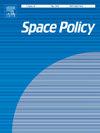哥伦比亚空军太空计划的进展
IF 1.9
4区 社会学
Q2 INTERNATIONAL RELATIONS
引用次数: 0
摘要
本文全面概述了哥伦比亚空军(FAC)的太空计划,分析了其政策框架、竞争优势、增长前景和研究努力。它深入研究了该计划的历史根源,评估了其全球地位,并详细介绍了航空航天部队进行的研究。文章还强调了航空航天技术研究中心(CITAE)在FAC组织结构中的关键作用。此外,它还研究了FAC开创性空间计划中立方体卫星、加密算法和任务控制软件的集成。SAT-CHIRIBIQUETE卫星的发射、人工智能卫星图像处理技术的发展以及FACSAT-1的部署等关键里程碑展示了该项目取得的显著进展。此外,本文还探讨了该计划对环境监测、资源管理和国家通信网络的潜在影响,说明了该计划对哥伦比亚社会、政治和经济领域的更广泛贡献。总之,这项全面的分析揭示了哥伦比亚航空公司的空间计划如何从一个雄心勃勃的愿景转变为一支准备推动哥伦比亚登上全球空间舞台的先锋力量。本文章由计算机程序翻译,如有差异,请以英文原文为准。
Advancements of the Colombian Air Force space program
This article comprehensively overviews the Colombian Air Force's (FAC) space program, analyzing its policy frameworks, competitive edge, growth prospects, and research endeavors. It delves into the historical roots of the program, assesses its global standing, and details the research conducted by the Aerospace Force. The article also highlights the crucial role of the Aerospace Technologies Research Center (CITAE) in the organizational structure of the FAC. Furthermore, it examines the integration of CubeSats, encryption algorithms, and mission control software within FAC's pioneering space programs. Key milestones such as the launch of the SAT-CHIRIBIQUETE satellite, the development of AI-powered satellite image processing, and the deployment of FACSAT-1 showcase the program's remarkable progress. Additionally, the article explores the program's potential impact on environmental monitoring, resource management, and national communication networks, illustrating its broader contribution to Colombia's social, political, and economic spheres. In conclusion, this comprehensive analysis reveals how FAC's space program has transformed from an aspirational vision into a vanguard force poised to propel Colombia onto the global space stage.
求助全文
通过发布文献求助,成功后即可免费获取论文全文。
去求助
来源期刊

Space Policy
Multiple-
CiteScore
3.40
自引率
36.40%
发文量
40
期刊介绍:
Space Policy is an international, interdisciplinary journal which draws on the fields of international relations, economics, history, aerospace studies, security studies, development studies, political science and ethics to provide discussion and analysis of space activities in their political, economic, industrial, legal, cultural and social contexts. Alongside full-length papers, which are subject to a double-blind peer review system, the journal publishes opinion pieces, case studies and short reports and, in so doing, it aims to provide a forum for the exchange of ideas and opinions and a means by which authors can alert policy makers and international organizations to their views. Space Policy is also a journal of record, reproducing, in whole or part, official documents such as treaties, space agency plans or government reports relevant to the space community. Views expressed in the journal are not necessarily those of the editors or members of the editorial board.
 求助内容:
求助内容: 应助结果提醒方式:
应助结果提醒方式:


